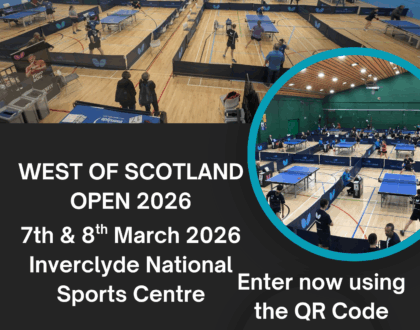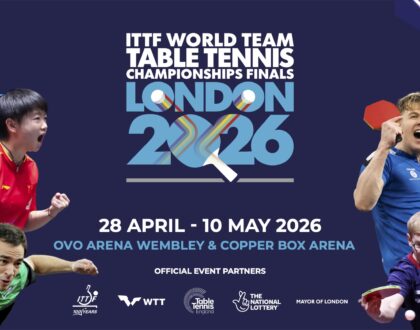COVID-19 UPDATE – 6th May
6 MAY 2020
Dear Members, Colleagues and Friends,
This week we await two important announcements from Government (Nicola Sturgeon tomorrow and Boris Johnson on Sunday) regarding exit strategies from the current lockdown.
Yesterday TTS took part in a conference call which included the Sports Minister in Scotland, Joe Fitzpatrick and sportscotland Chief Executive, Stewart Harris. Both were at pains again to stress that sport would not be returning to normal “any time soon”. Sportscotland has been charged by government to work with Scottish Governing Bodies in the coming weeks and months to work up plans for a phased return to some form of activity. We will keep you fully informed of these developments.
While we wait for more specific guidance I know that many of you are enjoying discussing what table tennis might look like post lockdown: the document below is published courtesy of our colleagues in the DTTB, the German Table Tennis Federation and will undoubtedly provide you with food for thought. This piece was posted on the DTTB website on 21 April. I hope you find it an interesting read.
Let us know your thoughts and share your ideas with members. We are keen to hear from you!
Stay safe, stay healthy and stay at home for just a little longer.
Richard Yule
Corona: Recommendations for club-based sports in table tennis
SH April 21, 2020
Frankfurt / Main. Through the German Olympic Sports Confederation (DOSB) and the state sports associations, the German table tennis association and its 18 state associations are invited to submit concrete proposals for an adapted sporting activity for the time from which the current contact restrictions to curb the Covid-19 pandemic continue to relax will. The Presidium of the German Table Tennis Federation and a group of experts from different fields have developed the recommendations below, which can serve as a basis for discussion for political decision-makers to decide on an opening for table tennis. These are measures for the careful resumption of common sporting activities that the respective active people and clubs should strictly implement.
“We do not want to make demands or even build pressure on politicians, we want to make our contribution in order to cope with the corona crisis in the best possible way in solidarity with the other social groups and sports associations,” said DTTB President Michael Geiger. “In the context of a gradual relaxation, this also includes enabling people to do sports together in compliance with distance rules for the personal protection of each individual. Our sport as individual and non-contact sport makes this possible – with a number of small adjustments – in our opinion. “
Two-stage re-entry: first training, later competition
Last but not least, the DOSB had pointed out the loneliness resulting from the contact and exit restrictions and the lack of exercise as well as the high social and psychological stress in the families, which could be counteracted by opening up to club sport. The The umbrella organization of German sports published ten so-called guardrails in mid-April , which, if used consistently, will reduce the risk of infection. The umbrella associations should develop sport-specific transitional regulations taking these guidelines into account.
“Sports clubs make a valuable contribution to the coexistence of society and health. The understandable restrictions to slow the pandemic are easier to bear in the long term if you give people a perspective, at least in small places, ”said DTTB General Secretary Matthias Vatheuer.
The DTTB concept provides for a two-stage re-entry, first in training, then in competition, which would normally start at the end of August. Table tennis Germany had already ended the 2019/20 season for team play throughout Germany from the lowest district class to the Bundesliga with the exception of the TTBL play-offs.
Recommendations from the German Table Tennis Federation for re-entering training and competition operations
Description of table tennis in general:
- Table tennis is individual sport
- Table tennis is not a contact sport
- Training partners / competition opponents are separated by at least 2.74 meters (length of the table)
Adjustments in training or competition practice
- The applicable clearance and hygiene measures are observed
- The training times are divided individually within the upper limits for the number of participants (no open training company)
- Tables and materials are assembled and disassembled by permanently assigned persons who use gloves and a face mask
- Wherever it is possible, the tables for training are set up in the outdoor area of the halls
- All tables used are spatially separated from each other by borders, in halls with partition curtains these are also used. The game boxes (according to the rule at least 12 x 6 meters) can also be built larger
- The players only use their own rackets, no rental clubs from the club / coach
- There are fixed training pairs
- Protected training is offered to members of risk groups at certain times
- A 10-minute break is scheduled between two table assignments to enable a contactless change at the table
- No doubles are played
- The players in a pairing each use their own ball, which only they can touch or bring into play
- The two balls of the training pairing are clearly distinguishable from each other (e.g. white / orange)
- There is no training on the ball robot or ball bucket training
- There is no change of sides
- Changing rooms and showers are not used
- No handshaking / clapping at the beginning and end of the game
- No breathing on the ball
- No wiping of hand perspiration on the table
- Trainers in youth training keep their distance, wear a face mask and do no movement corrections / assistance
Competition operation (regular start at the end of August)
Additional regulations for competitions:
- The journey to competitions is individual, not in carpools
- Individual competitions take place with a limit on the number of people present in the hall in accordance with the applicable regulations
- The game system in league play operations can be adapted to the regulations applicable at the start of the season (teams of 3, 4 or 6 without doubles)
- The entire course of the competition (playing, coaching, team bench, if necessary the use of a referee) is designed in such a way that the distance requirement is maintained over the entire duration of the competition
Recommended Posts

West of Scotland Open 2026
January 14, 2026

Priority Window Now Live!
December 15, 2025

ITTF World Team Table Tennis Championships London 2026
December 15, 2025
